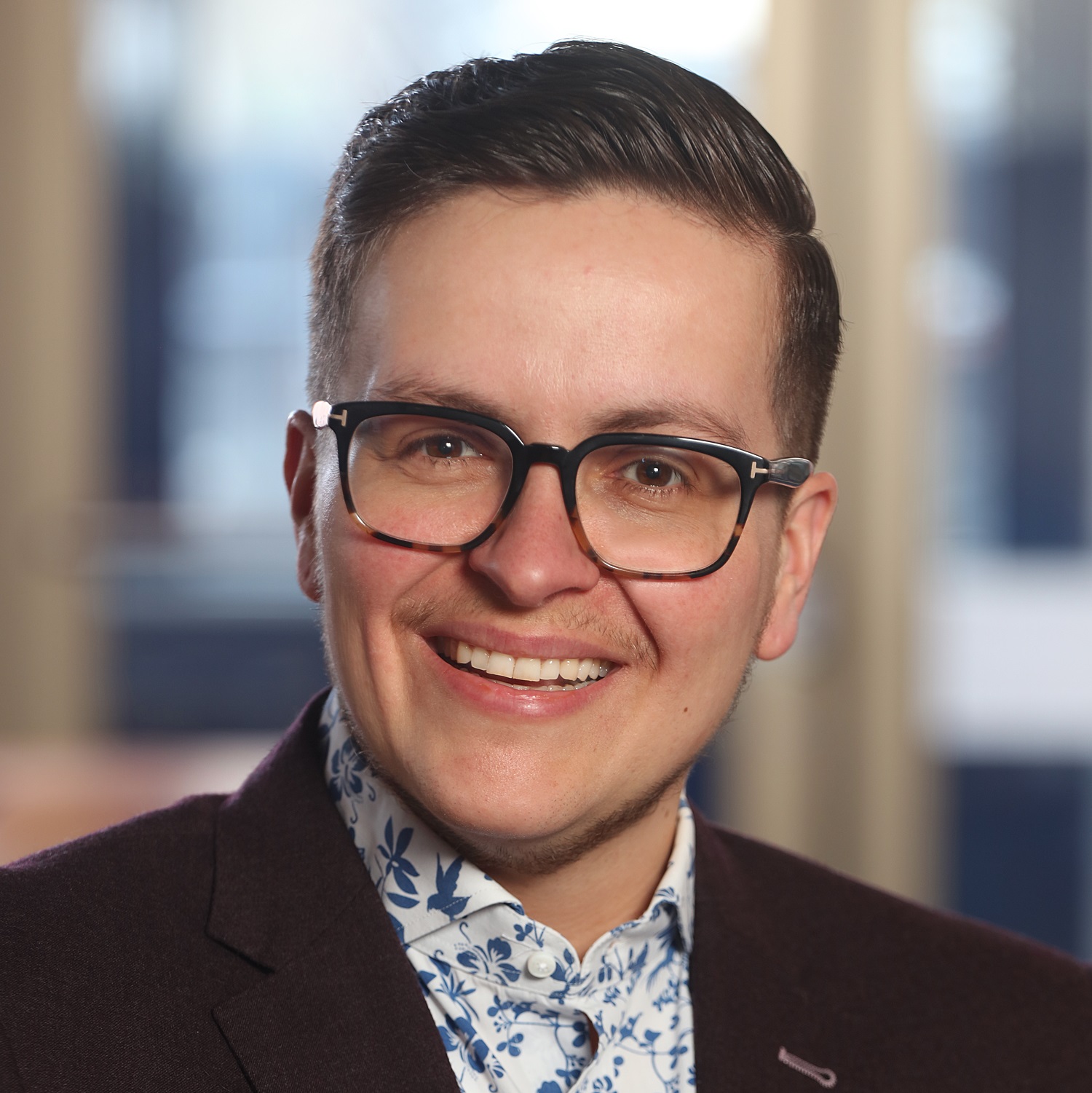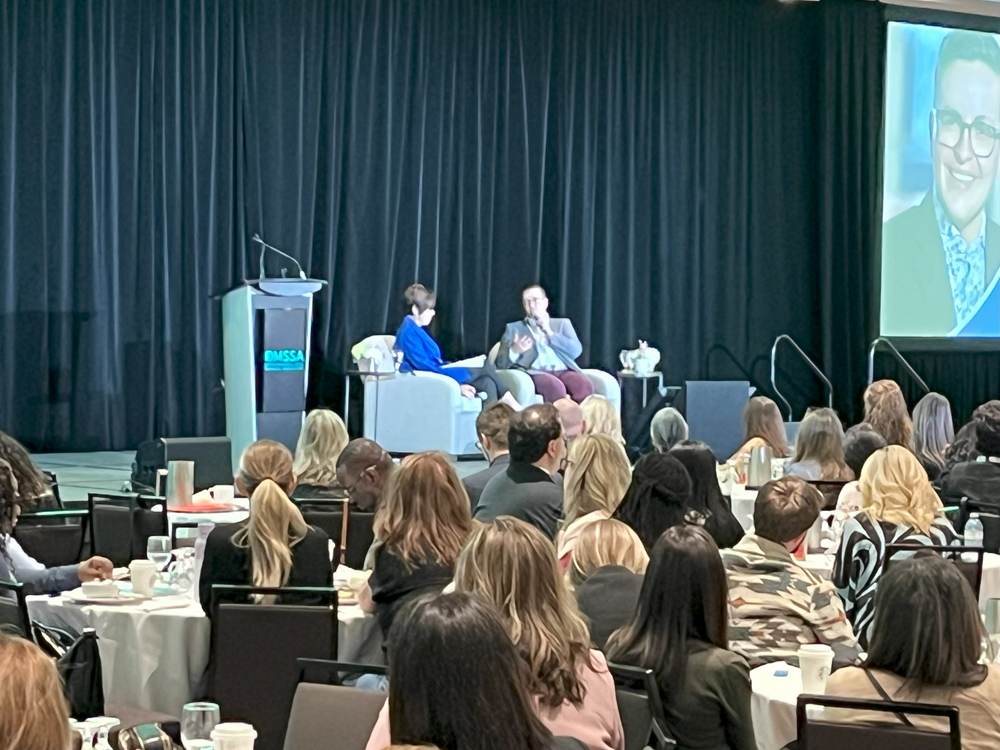Lee Airton Real Talk and Fireside Chat Summary
Lee Airton Real Talk and Fireside Chat Summary
By: Angelica Nuguid
June 2024

One area Lee highlights in their discussion is that access to transition support is limited. Queer and transgender people are accessing services every day, whether you are aware of it or not. Transgender people remain one of the most vulnerable populations in the province. Among transgender people who completed the TransPulse Ontario study, the median income is $15,000 a year despite transgender people having more post-secondary education than the population average.
The same study found that one in four trans people suspected they were fired because they were transgender. One in five trans people saw and heard enough during a job search process to decline the position, even if they had secured a position. They knew they had to walk away based on what they heard and saw, and how they were treated, during the interviewing process.
Often, Lee is asked how things are going in their area of work: gender diversity in education and other public-facing sectors. Up until 2023, Lee says things were going well. Their job was to ask how questions and not just why questions.
Examples of this are, How can we change this requirement/process/tradition? How do we support a non-binary person in a building? This was a time of how and not why should we. In 2024, colleagues are asking plenty of why questions. It is now a period of asking why and not how.
Although the years up to 2023 led to a lot of positive policy development and structural change, Lee said that the best policy is only as good as the sense of safety and confidence of people who are required to act on it, and right now that safety and confidence are diminished.
Trans people are scared, even the ones who are privileged. Trans people see organizations quietly pulling back on support related to gender (and sexual) diversity because of fear. Lee sees things like hesitation to offer gentle pronoun correction, initiatives or events being cancelled or moved online, and pronoun sharing (like in email signatures) becoming less and less common. People are scared, and not only transgender people. Lee asked attendees to keep on welcoming LGBTQ+ community members clearly and explicitly, and practicing ways to support trans people and members of the LGBTQ+ community. It is especially important for leaders to ensure that everyone in their workplace knows that they are supported in enacting human rights and other policies.
Lee wrapped up their introductory remarks with this point: the only thing that has changed since 2023 is fear.
 Fireside Chat:
Fireside Chat:
Stella Danos-Papaconstantinou (SDP), OMSSA’s Vice-President and Commissioner of Social Services for the Region of Durham, sat down with Lee Airton (LA) to discuss different topics.
SDP: Why are we in this position of fear?
LA: With the sense of homelessness, the housing crisis, and housing affordability, people are struggling. This is panic and fear among people who see resources being provided to groups historically under-represented and marginalized in our institutions, at a time when most people are feeling like they don’t have enough. Historically in hard economic times, people have looked around for places to focus their difficult feelings and even anger. This has been queer and trans people before, historically, and it may be us again in the future.
SDP: Can you talk a bit about your childhood and your experience with gender growing up?
LA: Our lives would be different if we were born at a different time and in a different generation. Growing up, Lee was surprised to hear revolutionary words like partner and, even as a young adult, to first meet someone with they/them pronouns. Lee goes on to say that we all have experience with gender.
We all noticed the rules that have changed and the transitions in dress code and pronouns. A word can have a lot of power. Lee is grateful that they were born at a time when it was possible for them to be who they are. They recognize that times have changed so fast.
Lee then talks about their two birthdays, their actual birthday and their trans birthday. Lee describes their trans birthday as sometimes bittersweet because they recognize the progress we’ve made and how grateful they are to be where they are and that children and youth today can have an experience Lee and their age peers could not.
SDP: Can we talk about the systemic barriers experienced by the LGBTQ+ community and areas that we need to change and make improvements on?
LA: One barrier is the barrier of custom. An example of this is the custom of the legal name requirement on any government form. It is customary to think that a form needs a legal name. It’s a way we have done this. However, no one has checked if we are required to have a legal name in a particular service context. Do they need to have the money to pay for a name change?
A takeaway from this is that there is a roadblock of this is what we have to do and that we should normalize asking why? Why are we collecting gender in this form? Is this mandatory? Are they barriers of a custom or can we stop doing them?
Moving on to the topic of gender transition, for people of any age, Lee states that they know with great certainty that the information being shared about this in everyday conversations such as in the workplace and online is incorrect. The problem in 2024 is that there is not enough understanding and humility with this topic.
SDP: How can we be better allies?
LA: Lee doesn’t use the term ally in their work because their work is about gender. They encouraged attendees to think of themselves as people who know a whole lot about gender and how it works.
Lee shares the story about the first day of meeting their Dean. On this day, the first thing the deans says is, Has anyone shown you our gender-neutral bathroom? This leader showed Lee that this was important to the university. Lee says that these things are what is disappearing. This leadership is integral to keeping these gestures alive. This helps pull back people who are scared and helps restore their faith.
Audience Q&A Session:
SDP: How can you navigate these conversations with community members who decline to engage in conversations of gender identity and expression?
LA: Lee doesn’t mind disinterest or disengagement. Lee believes that people don’t have to take on these issues with passion or gusto just to do their job: provide a service or interaction free of gender identity, gender expression, and sexual orientation discrimination.
Lee emphasizes that there needs to be clear and professional boundaries of what is acceptable. People should be practicing professional competencies. They are free to have their views, but they should respect workplace expectations.
If someone is misgendered in a workplace, it is the leader's problem and not the transgender person's problem. When conflict arises in the workplace, leaders should ground their conversations in policies, laws, and legal obligations.
SDP: Black trans folks have rates of victimization that are off the charts. Solidarity? How?
LA: Community estimates about the life expectancy for a transgender woman of colour have gone as low as 30 years. Lee encourages equity and not equality (same funding, resources, etc. for everyone) approaches when supporting Black and Indigenous transgender people and transgender women or trans-feminine people, in particular, given these disparities.
In Lee’s own sector (education), they encourage school staff to have open communication and ongoing support for Black transgender young women when preparing to graduate in order to support life transition planning, as needed. There are parallels in social service contexts.
SDP: Are there available resources around baseline service guidelines or best practices that you would recommend?
LA: Their book, Gender: Your Guide (www.genderyourguide.com). Lee also encourages members to contact Pride At Work Canada. They offer training and resources surrounding an inclusive workplace.
SDP: I have not added pronouns to my email signature because which ones used to refer to me doesn’t matter to me, but did I understand correctly that including preferred pronouns is a way to be supportive?
LA: We all care about being called the right pronoun especially when you have experienced being misgendered. Having your pronouns in your email signature simply shows transgender people that you know pronouns matter, and that you know how to respond when, for example, someone needs to gently correct you (you will just say sorry, rephrase, and move on).
Raising this ‘little flag’ about your gender diversity knowledge and competency can help ease the interaction between colleagues, and with clients. This is a way to show the community we are willing to help.
Stella’s takeaways from the conversation for the audience:
- People are scared.
- We have a role to play in our sector.
- We can go from why to how.
- We need to show humility in our work and daily conversations and interactions.
- Pay attention to equity, not equality.
OMSSA would like to thank Lee and Stella for the discussion on Day 2 of the 2024 Exchange Conference.
About the Author

Angelica Nuguid is a third-year Public Relations Student at Humber College joining OMSSA as a Communications Intern as of January 2024.
Blog categories: Interview, Gender, Transgender, Non-Binary, Human Services Delivery, Exchange Conference.